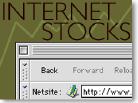|
Net stocks defy gravity
|
 |
March 11, 1999: 1:11 a.m. ET
Xoom.com is a hot company in a hot sector; how long can the boom go on?
|
NEW YORK (CNNfn) - When Chris Kitze was a boy, he dreamed of becoming an astronomer. But today, the space he occupies is relatively small and ordinary.
"This is ripped here. I haven't had time to fix it," he said, pointing out the tattered carpet beneath his feet. And his furniture was bought second hand, he added, slapping his desk with his hand. "It's 100 bucks, it's paid for and we're happy to have it."
And thought the view outside his window is less than stellar, don't feel bad for him.
"Yeah, well our shareholders don't buy our stock because of the view outside my window."
Since Kitze's Internet company, Xoom.com, went public in December, it has lived up to its name, zooming up in stock market value, quadrupling in just three months. Today, worth $700 million, Xoom.com (XMCM) joins a litany of Internet stocks supercharged by investor mania. Kitze's personal stake in the company alone is worth $200 million.
"I'm lucky. I'm just in the right place at the right time," he said.
The right time indeed, for almost any business on the Internet. Online auction house eBay (EBAY) is worth $13 billion, about 10 times as much as the legendary auctioneer, Sotheby's (BID). Amazon.com (AMZN) is worth $18 billion, almost 10 times as much as the nation's biggest bookseller, Barnes & Noble (BKS).
And the granddaddy of them all is AOL. With a value of about 80 billion dollars America Online (AOL) is worth more than United Airlines (UAL), RJR Nabisco (RN), Sears (S) and General Motors (GM) - combined.
"This, to me, has been the biggest quote-unquote mania that I've ever seen in my 27 years," said Brian Finnerty, a stock trader at the Wall Street firm of Unterberg Towbin.
"They always say that the Street, that Wall Street is six months ahead of the economy," Finnerty said, "but it seems in these Internet stocks, we've gotten two years ahead of the game. That's the only problem. So, I think we've gotten further out than the six months."
Kitze calls it "mega-explosive growth." His Xoom.com is one of the leaders in the field of direct marketing on the Internet, selling everything from computer software to Furbies to ice cream makers.
It's the 11th most popular destination on the World Wide Web, more popular than Amazon.com or eBay. But like most Internet companies, Xoom.com is still years away from turning a profit. It lost $9 million last year.
And when you look around Xoom.com's offices, it doesn't look like a company worth close to a billion dollars. Boxes litter the floor. There seems to be a tangled web of wires around every corner.
So what are Xoom.com shareholders getting, besides a messy, rented office and a money-losing company?
"What they're buying into is a business that's growing very, very quickly that we think is at a very exciting place in the market," Kitze said.
But some observers say what investors are really buying into is a "bubble" -- a phenomenon in which speculation feeds on itself, pushing prices to sometimes irrational highs. The classic textbook example of a bubble comes from 17th century Holland. In 1637, Dutch investors went crazy, selling off homes and livestock to turn a quick profit in tulips.
Now, these weren't ordinary tulips -- they were infected with a rare virus that caused them to bloom in spectacular fashion. But investors didn't care how they looked, they just cared how much the flowers were shooting up in price. In February tulip prices soared 2,000 percent, but in March, the bubble burst.
When the tulip bubble burst, it didn't just take down investors. So many people lost so much money, the Dutch economy actually plunged into recession. The ultimate irony then was that even people who made money off the tulips were left poorer by the experience.
There is a lesson here that bubble investors tend to ignore in the face of a quick buck. Your success depends entirely on finding someone who is willing to pay more than you did, and quickly. Wall Street even has a name for it -- it's called the greater fool theory.
So far Internet stocks have made investors look like anything but fools. But with so few of them turning a profit, are companies like Xoom.com the tulips of today?
"I think there's something here. There is a bubble, certainly I think some of the valuation is, some people have called it frothy and speculation and so forth. Other people have no concept of what is going on in the Internet, and so they don't believe in the model of the Net," Kitze said.
Adds Jeff Rosensweig, a finance professor at Emory University in Atlanta: "There is one essential difference. Tulips, after all, are just tulips. They're beautiful and they've gone on to have a nice history. We have tulips all around Emory University. However, the Internet is something that could change the face of business."
That is what Chris Kitze and Internet stock investors are counting upon.
"It's just such an exciting time. This kind of thing happens once in a lifetime," Kitze said. "Five years from now, everybody will be looking back and saying, 'Gosh, what an amazing time.' It just dwarfed the PC revolution and biotech and all the other crazes that have come and gone and it literally will change the world and the way people will do business. And that's very powerful."
|
|
|
|
|
|
Xoom.com
|
Note: Pages will open in a new browser window
External sites are not endorsed by CNNmoney
|
|
|
|
 |

|

